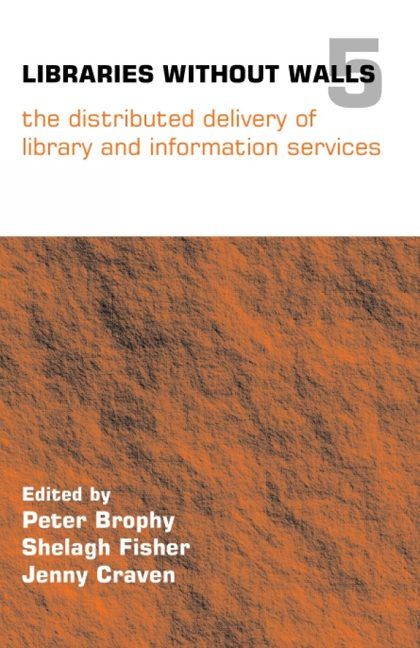Book contents
- Frontmatter
- Contents
- Contributors
- 1 Introduction
- 2 Keynote paper: beyond the mainstream of library services
- THEME 1 THE INTEGRATION OF LIBRARY SERVICES AND VIRTUAL LEARNING ENVIRONMENTS
- THEME 2 THE RELATIONSHIP BETWEEN USER NEEDS, INFORMATION SKILLS AND INFORMATION LITERACIES
- 8 Embedding information skills in the subject-based curriculum
- 9 Ways to engage widening participation students
- 10 Information literacy and learning
- 11 Information literacy – who needs it?
- THEME 3 USABILITY AND ACCESSIBILITY OF DIGITAL LIBRARY SERVICES
- THEME 4 DESIGNING THE INFORMATION ENVIRONMENT: NATIONAL AND INSTITUTIONAL PERSPECTIVES
- THEME 5 THE CREATION OF DIGITAL RESOURCES BY USER COMMUNITIES
- Index
- Miscellaneous Endmatter
- Miscellaneous Endmatter
- misc-endmatter
- Miscellaneous Endmatter
11 - Information literacy – who needs it?
from THEME 2 - THE RELATIONSHIP BETWEEN USER NEEDS, INFORMATION SKILLS AND INFORMATION LITERACIES
Published online by Cambridge University Press: 08 June 2018
- Frontmatter
- Contents
- Contributors
- 1 Introduction
- 2 Keynote paper: beyond the mainstream of library services
- THEME 1 THE INTEGRATION OF LIBRARY SERVICES AND VIRTUAL LEARNING ENVIRONMENTS
- THEME 2 THE RELATIONSHIP BETWEEN USER NEEDS, INFORMATION SKILLS AND INFORMATION LITERACIES
- 8 Embedding information skills in the subject-based curriculum
- 9 Ways to engage widening participation students
- 10 Information literacy and learning
- 11 Information literacy – who needs it?
- THEME 3 USABILITY AND ACCESSIBILITY OF DIGITAL LIBRARY SERVICES
- THEME 4 DESIGNING THE INFORMATION ENVIRONMENT: NATIONAL AND INSTITUTIONAL PERSPECTIVES
- THEME 5 THE CREATION OF DIGITAL RESOURCES BY USER COMMUNITIES
- Index
- Miscellaneous Endmatter
- Miscellaneous Endmatter
- misc-endmatter
- Miscellaneous Endmatter
Summary
Introduction
There is a set of skills and some underpinning knowledge that librarians and an increasing number of other people call information literacy. In the UK, policy in further and higher education is beginning to acknowledge a need for these skills to support the development of lifelong learners, but, in this respect, we lag far behind our colleagues in Australia and North America. While we may never catch up with them, we are extremely fortunate in being able to learn from their experience and be inspired by their success. However, an audit of higher education and further education institutions in the UK in 2002 reported that 57% of participating institutions included information literacy in their learning and teaching strategies, which is most heartening (Big Blue, 2002). In other words, according to librarians and education policy-makers, learners need information literacy.
The last five years in the UK have seen valuable exploratory work carried out by both the Society of College, National and University Libraries (SCONUL) Advisory Committee on Information Literacy and the Joint Information Systems Committee (JISC)-sponsored Big Blue project. Both report that, despite excellent examples of good practice, there is still confusion, patchy provision and a lack of nationally accepted definitions and guidelines. Indeed our professional body, the Chartered Institute of Library and Information Professionals (CILIP), held an expert seminar as recently as June 2003 to try and agree an ‘official’ definition of information literacy.
Given this background it is hardly surprising that the holy grail of information skills integrated throughout the curriculum in UK further and higher education can appear elusive. Similarly, a study of information literacy in third level undergraduate education in the Republic of Ireland found that ‘examples of successful initiatives are comparatively rare (although increasing), and non-existent in some contexts’ (McGuiness, 2003, 245).
Experience at the Open University
The Open University (OU) is a large distance teaching university with around 200,000 registered students dispersed around the UK and worldwide. Like many other universities we have a major objective to ‘integrate [information literacy] skills into the curriculum’ (Open University Library Information Literacy Unit Strategy, 2003) and we are monitoring our progress carefully.
- Type
- Chapter
- Information
- Libraries Without Walls 5The Distributed Delivery of Library and Information Services, pp. 109 - 120Publisher: FacetPrint publication year: 2004
- 1
- Cited by



